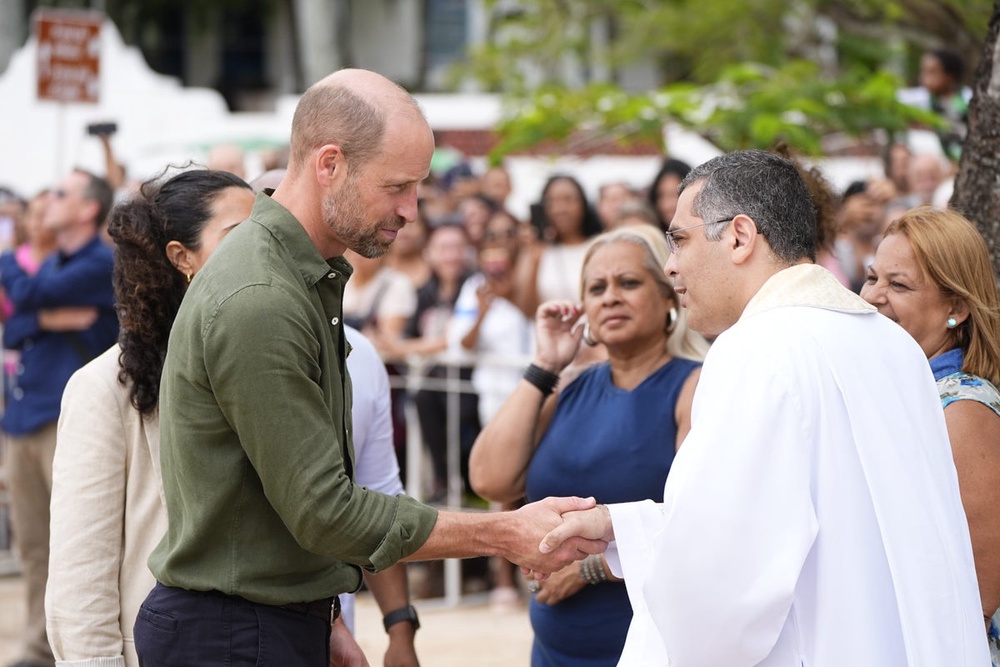“William is truly a people’s king.” On his second day in Brazil, HRH Prince William showed the world exactly what modern leadership looks like — not from a palace balcony, but from the muddy mangroves of Paquetá Island. By morning, the Prince of Wales rolled up his sleeves alongside local conservationists, helping restore the island’s fragile mangrove ecosystem — laughing, learning, and listening as he worked shoulder to shoulder with volunteers. Residents said he was “kind, curious, and completely genuine.” And by evening, he stood before world leaders at the United for Wildlife Summit in Rio — delivering a powerful message that echoed far beyond the room: “Environmental crime isn’t just a conservation issue — it’s a threat to global stability.”  From planting trees to confronting the global networks behind illegal wildlife trade, Prince William’s day was a masterclass in humility, compassion, and purpose. He didn’t just talk about change — he lived it. Locals called him “the people’s king,” and even longtime critics are praising his hands-on approach to leadership that bridges communities, conservation, and global action. This is what modern royalty looks like — grounded, global, and guided by impact, not image
From planting trees to confronting the global networks behind illegal wildlife trade, Prince William’s day was a masterclass in humility, compassion, and purpose. He didn’t just talk about change — he lived it. Locals called him “the people’s king,” and even longtime critics are praising his hands-on approach to leadership that bridges communities, conservation, and global action. This is what modern royalty looks like — grounded, global, and guided by impact, not image
“William Is Truly a People’s King” — The Prince of Wales Wins Hearts in Brazil with a Powerful Message for the Planet
On his second day in Brazil, Prince William proved why so many are calling him “the people’s king.” From the mangroves of Paquetá Island to the global stage of Rio de Janeiro, the Prince of Wales struck a rare balance between humility and leadership — connecting with local communities while confronting one of the most urgent crises of our time.
In a single day, he went from planting hope — quite literally — with conservationists in the muddy wetlands, to delivering a powerful speech at the United for Wildlife Global Summit, reminding the world that “environmental crime isn’t just a conservation issue — it’s a threat to global stability.”
A Morning in the Mangroves

Early in the day, the Prince traded palace formality for rolled-up sleeves and muddy boots as he joined local volunteers and marine biologists on Paquetá Island, where restoration efforts are underway to revive the region’s endangered mangrove ecosystems.
Witnesses described him as “warm, genuine, and fully present” — chatting with young volunteers, asking questions about their work, and even helping plant mangrove seedlings himself.
“He didn’t just pose for photos,” one volunteer said. “He got his hands dirty — literally. You could tell he wanted to understand, not just observe.”
For the Prince, this wasn’t a photo opportunity; it was a message. Mangroves — often called “the lungs of the coastline” — are crucial in fighting climate change, protecting coastal communities, and sustaining biodiversity. His involvement underscored his growing role as a global advocate for practical, people-driven environmental action.
A Powerful Evening Message
That evening, in stark contrast to the quiet of the wetlands, Prince William took the stage at the United for Wildlife Summit, where government officials, environmental experts, and global leaders gathered to discuss the fight against illegal wildlife trade.
His tone was serious — and his words, uncompromising.
“Environmental crime isn’t just a conservation issue — it’s a threat to global stability,” he declared. “It fuels corruption, destabilizes economies, and destroys communities. Protecting our natural world is not a luxury; it’s a necessity.”
The Prince’s speech drew praise across international media, with many noting his ability to connect environmental protection to social justice and global security — a broader, more modern approach to royal advocacy.
A Royal Who Leads by Example

In Brazil, the Prince of Wales demonstrated what a 21st-century royal can — and should — be: hands-on, informed, and deeply human.
His visit wasn’t about ceremony or speeches alone. It was about showing up — in classrooms, communities, and muddy shorelines — to listen, learn, and lead by example.
Local conservationist Ana Duarte summed it up best:
“He wasn’t distant. He was one of us — working, laughing, caring. That’s what leadership looks like.”
A Prince with Purpose

This trip marks another step in Prince William’s mission to use his platform for tangible impact. From his Earthshot Prize initiative to his United for Wildlife program, he’s building a global movement that turns royal influence into real-world change.
His time in Brazil captured that spirit perfectly — a day that blended empathy with action, and diplomacy with dirt-under-the-fingernails dedication.
And as one local headline put it:
“Prince William didn’t just visit Brazil — he showed up for the planet.”
From mangrove mud to the world stage, the Prince of Wales is proving that leadership isn’t about titles — it’s about action.



